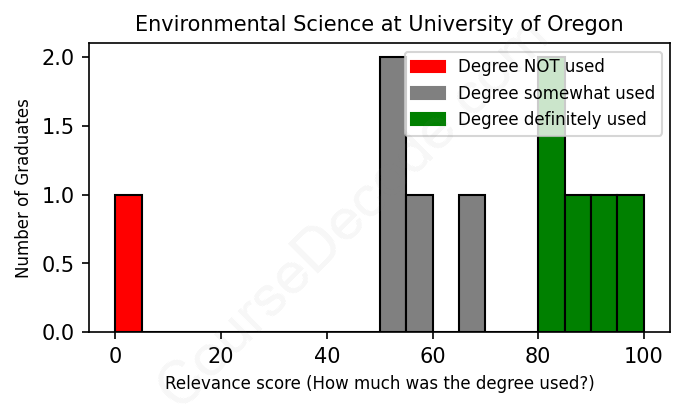
First, some facts. Of the Environmental Science graduates from University of Oregon we've analyzed , here's how many have used (or NOT used) their degree in their career:

These are estimates based on AI analysis of 10 LinkedIn profiles (see below).
The verdict? Slightly below average. Overall, with an average relevance score of 66%, Environmental Science graduates from University of Oregon have a slightly lower likelihood (-1%) of finding work in this field compared to the average graduate across all fields:
And for comparison, here's the chart for all profiles we've looked at across all degrees.
Also, after graduating, 70% of these graduates have pursued further education other than another Bachelor's degree (such as a Masters degree or other), compared to the average across all profiles of 35%. This suggests you may need more than just a Bachelors degree to be competitive as a Environmental Science graduate.
See the details:
|
Relevance score: 84% We think this person has gone into a career highly relevant to their degree. We think this person has gone into a career highly relevant to their degree.
DEGREE INFOGraduated in 2017 from University of Oregon with a Bachelor of Science - BS in Environmental Science. Also pursued further education since (see below). JOB HISTORY SINCE GRADUATIONEnvironmental Interpreter National Park Service Sep 2017 - Dec 2017 Research Assistant  U.S. Forest Service Feb 2018 - May 2019 Graduate Research Assistant  University of Colorado Denver Jun 2019 - Dec 2021 Tutor - Math, Science, Statistics  TutorMe Feb 2022 - Jun 2022 Tutor - Math, Science, Statistics  Varsity Tutors, a Nerdy Company Feb 2022 - Dec 2022 Tutor  Agate Tutoring Aug 2022 - Present Seasonal Naturalist  Northwest Trek Wildlife Park Apr 2022 - Apr 2023 Assistant Horticulturist  Northwest Trek Wildlife Park Sep 2022 - Apr 2023 Assistant Naturalist  Northwest Trek Wildlife Park Apr 2023 - Present FURTHER DEGREES DONE SINCE GRADUATINGGraduate CourseworkUniversity of Colorado Denver 2019 - 2021 Certificate UW Professional & Continuing Education 2022 - 2023 ABOUTI am an ecologist and educator, focusing on inspiring curiosity and building connections to nature. I currently work as a naturalist at Northwest Trek, and also have my own tutoring business. |
The top 10 most common jobs done by the graduates we've analyzed (ranked most common to least) are:
When looking at the career paths of graduates from the University of Oregon with a degree in Environmental Science, it seems like the most common jobs they land are in roles that align fairly well with environmental themes. Many graduates have taken on positions like Environmental Scientists, Data Scientists, and various research roles that require direct application of ecological and environmental knowledge. For instance, jobs such as North Pacific Groundfish Observer, Environmental Scientist/Planner at the EPA, and Restoration Interns at nature centers show a clear relevance to their studies. These positions directly use their training in environmental monitoring, regulations, and ecological restoration, which is pretty cool!
However, it’s also noticeable that some grads have drifted into fields that don't quite match up with Environmental Science. For example, positions like Design Interns at fashion companies or roles in marketing might not rely heavily on the specific knowledge areas gained during their degree. Some students took on roles in education or advocacy for environmental causes, which taps into their background to some extent, while others ended up in jobs where environmental science is hardly a factor. Overall, while many graduates do find relevant roles, there’s a significant number who seem to end up in unrelated areas, showing that while the degree offers strong foundational knowledge, it doesn't seal the deal on a direct career in Environmental Science.
Here is a visual representation of the most common words in job titles for Environmental Science graduates (this is across all Environmental Science graduates we've analyzed, not just those who went to University of Oregon):

Graduates from the University of Oregon with a degree in Environmental Science tend to start their careers in a variety of roles that can range from practical environmental jobs to internships or positions that may not seem directly related to their field. For many, the first job after graduation often involves positions as field assistants, interns, or entry-level roles in environmental research and planning, such as working with NGOs, environmental agencies, or even as observers for fisheries. This initial experience usually sets the stage for further specialization in the field, or shifts toward roles that emphasize research and data science, as seen with some graduates transitioning into data-centric positions in organizations like the EPA or tech firms.
Five to ten years after graduation, many alumni appear to have carved out solid paths in environmental-related careers. For instance, several have secured roles with prestigious organizations like the EPA or have taken on significant responsibilities as planners or researchers in environmental consulting firms. However, it’s also noticeable that some graduates have diverged from traditional environmental careers, taking on roles in marketing, education, and other sectors that, while not directly tied to environmental science, still utilize their analytical skills and training. Overall, while many University of Oregon Environmental Science graduates find meaningful and relevant work, there is also a segment that returns to fields that might seem more disconnected from their educational background. It's a mixed bag, but the skills learned in their degree often help them adapt to various career paths.
A Bachelor's degree in Environmental Science, like the one at the University of Oregon, can be a bit challenging but not necessarily the hardest degree out there. You’ll dive into a mix of science courses—think biology, chemistry, and physics—as well as some social sciences and policy stuff, which can be a lot to juggle. If you're really into nature and environmental issues, it might feel easier because you're motivated, but there are definitely some challenging concepts and lab work to tackle. Overall, it’s kind of average in difficulty; there will be tough moments, but with passion and good study habits, you can totally handle it!
Most commonly, in the LinkedIn profiles we've looked at, it takes people 4 years to finish a Bachelor degree in Environmental Science.
Looking at the job histories of these Environmental Science graduates from the University of Oregon, it seems like they have had a mix of experiences, but to be honest, it doesn’t look like they’ve hit the jackpot financially. Many of them have taken on internships and entry-level positions that typically don’t pay very well—especially in the early parts of their careers. For instance, the first grad spent a long time as an observer, which often isn’t a high-paying gig, and others jumped around from internships to assistant roles. While some appear to be moving up in their careers, like the 2016 grad who landed a role at the EPA, it's still pretty common to see these grads starting in low-paying or temporary jobs, especially given the nature of environmental work and the entry-level routes most seem to take. Overall, while they’re gaining valuable experience, it looks like they might be waiting a bit longer to see some serious cash flow.
Here is a visual representation of the most common words seen in the "about" section of LinkedIn profiles who have a Bachelor degree in Environmental Science (this is across all Environmental Science graduates we've analyzed, not just those who went to University of Oregon). This may or may not be useful:

Here are all colleges offering a Bachelor degree in Environmental Science (ordered by the average relevance score of their Environmental Science graduates, best to worst) where we have analyzed at least 10 of their graduates:
| College | Score | Count |
|---|---|---|
 University of North Carolina at Chapel Hill University of North Carolina at Chapel Hill
|
87 | 10 |
 The Ohio State University The Ohio State University
|
85 | 12 |
 University of Vermont University of Vermont
|
68 | 13 |
 University of Oregon University of Oregon
|
66 | 10 |
 Western Washington University Western Washington University
|
63 | 14 |
 University of Virginia University of Virginia
|
57 | 15 |
 Oregon State University Oregon State University
|
56 | 11 |
 Loyola University Chicago Loyola University Chicago
|
56 | 11 |
 Southern New Hampshire University Southern New Hampshire University
|
53 | 15 |
 University of Phoenix University of Phoenix
|
46 | 15 |
 Florida State University Florida State University
|
45 | 16 |